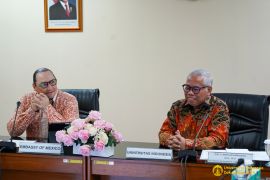Along with Indonesia, 189 nations made a promise to free people from extreme poverty and multiple deprivations. This pledge comprised the eight MDG to be achieved by 2015.Jakarta (ANTARA News) - Indonesia, one of the 189 countries that declared in 2000 their commitment to achieving eight Millennium Development Goals (MDG) by 2015, is still falling behind its targets in certain areas.
"Achieving the MDG by 2015 concerns the nation`s dignity in the international arena," Vice President Boediono told the National Consolidation of Indonesian Parliament`s Women`s Caucus over the weekend.
Along with Indonesia, 189 nations made a promise to free people from extreme poverty and multiple deprivations. This pledge comprised the eight MDG to be achieved by 2015.
The aim of the MDG is to encourage development by improving social and economic conditions in the world`s poorest countries and to eradicate extreme poverty and hunger; achieve universal primary education; promote gender equality and empower women; reduce children mortality; improve maternal health; combat HIV/AIDS, malaria and other disease; ensure environmental sustainability; and develop a global partnership in development.
However, the country has fallen behind in finishing three targets of the MDG 2015, including maternal mortality rates, HIV/AIDS eradication programmes, and access to drinking water and basic sanitation.
Health Minister Endang Rahayu Sedyaningsih said recently that Indonesia had to catch up on its MDG targets in the coming three years. She noted that of the eight goals, five were in the health sector.
"We have to work hard to achieve the targets in the coming three years. We should not work as if it were business as usual. Innovation, breakthrough, and focus must be made on priority activities," Endang was quoted on the official website of the Health Services of the East Kalimantan Province.
She acknowledged that Indonesia still had to work hard to lower the mortality rate of mothers during labour to 120 per 100,000 live births.
The Indonesian Basic Health Survey (SDKI) 2007 results showed that mothers` mortality rate reached 228 per 100,000 per live births, higher than the MDG target of 161 per live births in 2015.
The same case is also true for the mortality rate of children less than five years old (Balita). Last year, the mortality rate of infants aged 0-11 months was about 34 per 1,000 live births, higher than the MDG target of 23 per 1,000 live births.
But Endang stated that Indonesia`s efforts to reduce the mortality rate of Balita to two-thirds from the 1990 conditions were on track. "The death rates of infants and Balitas have continued to decline," she argued.
However, the minister said that neonatal mortality rate needed attention. "Neonatal mortality rate tends to be stagnant. Nutritional intake and infection are two significant factors affecting the life of infants. Research showed in 2007 that 36 percent of infant deaths were caused by neonatal problems, 17.2 percent by diarrhoea, and 13.2 percent by pneumonia," she added.
With regard to other diseases such as HIV/AIDS, tuberculosis, and malaria, the country still faces hurdles to stopping their spread and reducing the number of cases.
Particularly with respect to HIV/AIDS, the government is very concerned because the number of carriers is still high, reaching 200,000 in 2011.
World leaders have been committed to halt this killer disease by 2015 and to begin reversing its spread. Yet, the number of cases worldwide has continued to increase. In 2009, for example, 33.3 million people were living with HIV. The same year, some 2.6 million people became newly infected and 1.8 million died of AIDS, including 260,000 children.
According to Endang, HIV/AIDS has spread further in the country because people in the high-risk group still lack knowledge about the virus. She said that they must increase their knowledge about HIV/AIDS, adding that people in risk group, such as sex workers, should be well-informed about the use of condoms.
Therefore, the government has to provide accurate information on how to overcome the spread of HIV/AIDS disease, give treatment to HIV/AIDS carriers, and reduce narcotics abuse which could have impact on the spread of the disease.
For this, Vice President Boediono, on the occasion of World HIV/AIDS Day last November, expressed hope that all parties, including businesses, non-governmental organizations, workers, and the people in general, must take active part in the fight to eliminate the disease.
He said that the government was now active in fighting HIV/AIDS, which was one of the main MDG goals in the health sector.
"Let us safeguard the MDG goals in the health sector in our country and renew our commitment to the achievement," he added.(*)
Reporter: By Andi Abdussalam
Editor: Heru Purwanto
Copyright © ANTARA 2012











